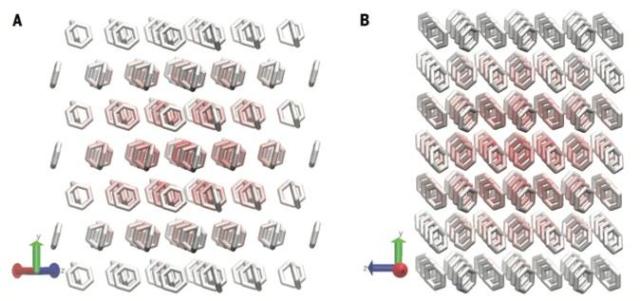 These are orthographic projections of a cluster cut from the benzene crystal along the two directions - Image Credit: Image courtesy of Science/AAAS
These are orthographic projections of a cluster cut from the benzene crystal along the two directions - Image Credit: Image courtesy of Science/AAAS
Atoms of a solid material are capable of adopting many different crystal structures, which can influence the properties of the material. However, predicting a material’s crystal structure that has the highest stability has been a longstanding bottleneck for researchers. A research group led by Professor Garnet K. L. Chan has addressed this challenge.
Accurately computing the lattice energy of a crystal structure in order to discern between various competing polymorphs is the key challenge. With the help of new techniques, the research group precisely calculated a benzene molecule’s lattice energy down to an accuracy of sub-kilojoule per mole. This level of certainty is adequate to resolve polymorphism.
The holy grail of this particular problem is to say, I've written down this chemical formula for a material, and then just from the formula be able to predict its structure—a goal since the dawn of chemistry.
Garnet K. L. Chan, the A. Barton Hepburn Professor of Theoretical Chemistry at Princeton University.
The developments in the quantum mechanics field have enabled the research team to achieve this feat. Chan, the A. Barton Hepburn Professor of Theoretical Chemistry at Princeton University, said that some of these developments enable resolving the characteristics of electrons more precisely, performing calculations on more atoms rapidly, and dealing with more electrons simultaneously. This achievement is the result of the modern field of quantum chemistry, allowing the determination of the characteristics of nature to this degree of accuracy, he added.
Reducing the time involved in running the calculations of interest is now the area of focus of Chan’s group. According to Chan, the research team spent several months on the computer for the initial calculations. Chan believes that the prediction time should be reduced to only a few hours by making some practical changes.
The Science journal has featured the study results.
References